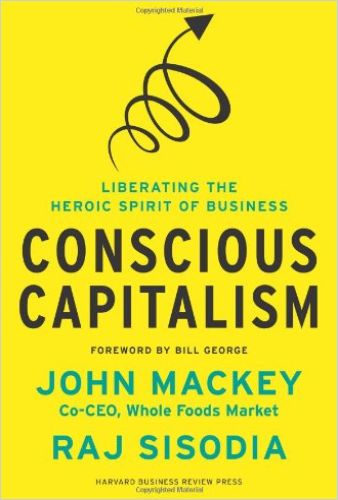John Mackey and Rajendra Sisodia make a compelling case for a more aware, conscious but still profitable approach to capitalism.

Practical Worthiness
If economic philosophy is your area, you may find John Mackey’s – CEO and co-founder of Whole Foods – and Babson College professor Rajendra (“Raj”) Sisodia’s methodical treatment of conscious capitalism more far-reaching and integrated than most other analyses. Their models include Whole Foods, which regards its suppliers, workers, customers and the environment as stakeholders.
The purpose of every business ultimately revolves around creating value for customers.John Mackey and Raj Sisodia
The Financial Times found this work “full of thoughtful insights.” Forbes.com said, “Buy it. Read it. Implement it. It’s a true guide to the future.” Business Insider wrote, “It’s as much about management as about philosophy.” And Howard Schultz, CEO of Starbucks, said, “I highly recommend listening to what they have to say.”
Meaning
John Mackey reports that before he helped start the Safer Way natural foods grocery store in 1978, he studied Eastern philosophy, religion and ecology. As Safer Way changed its name to Whole Foods, Mackey learned that business isn’t purely exploitative and that business and capitalism can be founts of good. These insights led him to explore economic theorists such Friedrich Hayek and Milton Friedman, who articulated the case for free enterprise.
Mackey addresses the dominant but erroneous view of capitalism to help readers understand that business can provide meaning. He and Sisodia explain that capitalism has made the world rich and raised standards of living and life expectancies. But businesspeople, the authors find, tend to maximize profit in ways that play into negative perceptions of capitalism. Mackey and Sisodia fear that crony capitalism – using the power of the government to generate profit – has displaced true free-market capitalism. In the authors’ view, the fall of the Berlin Wall and the creation of the internet exemplify the possibilities of freedom and cooperation.
In a long arc of history, no human creation has had a greater positive impact on more people more rapidly than free-enterprise capitalism. John Mackey and Raj Sisodia
The authors ground their discussion of conscious capitalism in thoughtful tenets. They place purpose before all other aspects of business and teach that knowing your company’s purpose gives your employees energy and adds meaning to their work. Fulfilling a purpose also generates profit and, the authors maintain, happiness is a natural consequence. People are happiest, they say, when their personal passions align with their organization’s larger purpose.
Stakeholder Integration
The authors insist that conscious businesses can establish and enjoy stakeholder relationships that differ from those of traditional businesses. Managers in traditional businesses look for trade-offs and seek self-aggrandizing deals, but conscious businesses seek shared synergies.
Voluntary exchange for mutual benefit creates the ethical foundation of business, and that is why business is ultimately justified to rightfully exist within a society. John Mackey and Raj Sisodia
Because every business exists to create value for its customers, your closest stakeholders are your customers. When customers communicate actively with a firm, the authors believe, they become a source of innovation.
A conscious business wants to serve, lead and educate its customers, and to make the world a better place. Leaders of conscious businesses, Mackey and Sisodia say, are emotionally and intellectually mature missionaries who invite everyone in the company to join them in fulfilling a higher purpose.
Principles
Mackey and Sisodia find that conscious businesses tend to decentralize more than traditional firms. They create a culture in which workers willingly share the company’s fate and pitch in beyond their job descriptions.
The persistent myth claiming that the ultimate purpose of business is always to maximize profits for the investors probably originated with the Industrial Revolution’s earliest economists.John Mackey and Raj Sisodia
Mackey and Sisodia caution that a founder of a conscious business must have a vision that inspires others by setting forth a purpose that resonates with them. A new company’s leaders should be transformational and should shape their culture accordingly.
Practical
Mackey and Sisodia explain you must stay practical as you apply the broader perspective of a conscious business, especially since conscious businesses financially outperform less aware organizations. Take companies like Costco that pay higher wages and offer better benefits and outperform their competitors, such as Walmart, which don’t. Businesses led by visionary leaders who emphasize stakeholder value over immediate profit outperform those led by autocratic leaders who emphasize financial return.
Voluntary exchange for mutual benefit creates the ethical foundation of business, and that is why business is ultimately justified to rightfully exist within a society.John Mackey and Raj Sisodia
Workers at conscious businesses enjoy greater engagement. Customers trust them, leading to a virtuous cycle and more sales. Conscious businesses have lower marketing costs because their ethics draw customers to them, and they experience lower turnover rates and lower expenses for recruiting, hiring and training employees.
Optimistic
The authors’ discussion of conscious commerce is exciting, but perhaps optimistic; they don’t mention that a business can reach for a higher purpose and still fail. Mackey and Sisodia prove compelling, but perhaps a shade too rosy about what even the most conscious economic system can deliver. Even so, Mackey’s journey from dreamy idealist to conscious capitalist offers a model for business owners seeking to operate more consciously and in greater service to stakeholders. Mackey and Sisodia, writing for businesspeople, avoid cheerleading and base their arguments in performance metrics, which will draw and intrigue owners of both new and long-standing companies.
Raj Sisodia also co-wrote Shakti Leadership; Firms of Endearment; and Everybody Matters. John Mackey wrote Passion and Purpose, and co-authored The Whole Foods Diet.













